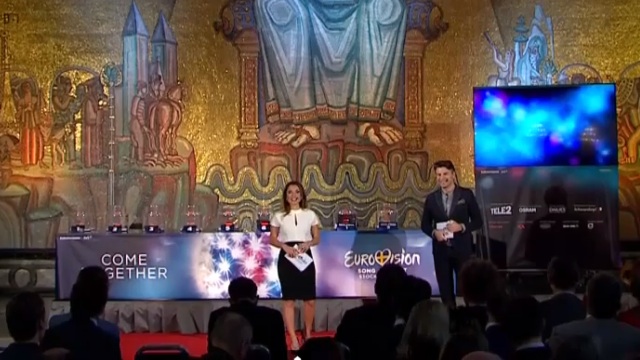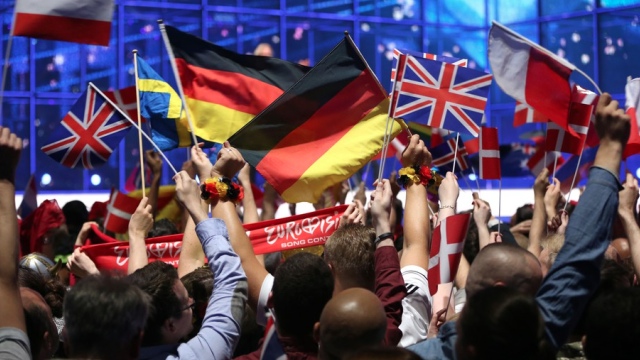The EBU’s Reference Group for the Eurovision Song Contest has announced that the Allocation Draw for the cancelled 2020 Song Contest will be rolled forward and used for Rotterdam 2021. The country line-ups for next year’s Semi Finals will match what we were expecting to see this year.
As the list of participating nations for next year matches the 2020 roster, this was an easy move for organizers to make. It should be noted, however, that the running order of the songs in each Semi Final will be determined at a later date, after all of the songs have been submitted.
While many dedicated fans will miss the pomp and circumstance of the Allocation Draw ceremony, where tiny paper scrolls in large crystal pots are given the reverence of holy relics and results are examined by pundits like us as closely as oracle bones, there is absolutely a benefit for skipping over the traditions to suit the new times we live in.

2018’s Semi Final Draw (image: Eurovision.tv / EBU)
Health And Safety Gone… Completely Reasonable
2020 has been a long and difficult year, but science is doing its thing. At some point during 2021 the hope is that the impact of the coronavirus pandemic will lessen.
While we don’t know which of the four scenarios that the EBU and AVROTROS will use, we do know that our actions between now and May will make a difference.
For that reason alone, putting our hosts, EBU representatives, delegation members, technical crew, and others into an indoor space (such as, say, January’s Allocation Draw) would be rather irresponsible from a public health standpoint. I would imagine that a similar stance might be taken for the Heads of Delegation Meeting in March, or for 2021’s Postcard recordings.
Simply put, by reducing international travel and potential contact, we’re keeping our extended Eurovision family safe.
Logistics, Logistics, Logistics
There are lots of logistical benefits to organizers, delegations, and fans by sticking with last year’s Semi Final draw. From an organizer’s point of view, there’s already been the skeleton of a plan in place from the 2020 event.
While the exact running order is yet to be determined, the team at AVROTROS can simply blow the dust off of last year’s organizational documents and get right to work. And considering that they’ve just bought themselves over two more months of time to plan for four different scenarios for staging and events, that time is worth its weight in tulip bulbs during the Dutch Golden Age.
For delegations, knowing which half of which Semi Final you’ll be performing in also means you have a pretty good guess of the days you’ll be rehearsing. Assuming no major national holidays are stopping work from occurring (as we had in Tel Aviv for Remembrance Day, or Copenhagen for Labour Day), countries performing in the first half of the first Semi Final might be rehearsing as early as a week and a half before their show.

Raising the flags of all nations after a rest day in Copenhagen (EBU/eurovision.tv)
Earlier rehearsal slots translate into more days in a hotel, more meals for your team, and more money spent, especially in a pricey city like Rotterdam. While more affluent delegations can shoulder the burden wherever they’re placed, nations with tighter budgets sometimes breathe sighs of relief knowing they’ll be performing later on, and don’t have to get to the host city right from the get-go. Having this information early will benefit broadcasters as they juggle budgetary discussions with their Eurovision delegation.
If there is an audience in Rotterdam’s Ahoy Theatre for next year’s event, the carryover of the Semi Final lineup is a boon to the fans who’ll be coming to Rotterdam, many of whom purchased tickets or made hotel reservations specifically to line up with when the countries they support will be performing. If tickets purchased for 2020 are carried over to 2021, but Israel, for example, is now performing in a different semifinal, you could have been facing a lot of disappointed fans with deflated hammers.
This is of course, assuming we have an audience, but the fact that this is a consideration shows the comprehensive planning going on.
A Little Something For The Spreadsheet
Those of us who love devouring the facts and figures that surround the Eurovision Song Contest have had to deal with the idea that the community will never know the winner of the 2020 Song Contest. We’ll never know who would have voted for ‘Cleopatra‘ or blanked ‘Think About Things‘, who would have qualified, and who would have just missed out.
However, by rolling the 2020 draw forward into 2021, the EBU and AVROTROS have given us a little bit of a plaything to tool around with: a peek behind the curtain on the producer-led running order.
During May 2020’s broadcast of ‘Europe: Shine a Light’, we all got a look at what the actual running order of the show would have been: from opening the first Semi Final with the uplifting pop from The Mamas, to closing the second Semi Final with a musical kick in the pants from Latvia’s Samanta Tīna. We don’t know the gimmicks, the colors, or the props that they would have brought, but it will be very interesting to see how the running order for 2021 shakes out, especially if returning acts from last year bring songs that are similar in style to their previous entries.
If Go_A send ‘Solovey 2.0‘, will they still be closing out their semifinal? Would the producers put Daði og Gagnamagnið and Gjon’s Tears back-to-back again? I’m already imagining sitting around a table with the rest of the ESC Insight crew, devouring the data, and trying to figure out why the producers do what they do.
A Eurovision For Our Time
The Eurovision Song Contest in 2021 was never going to be an orthodox one following the timetable of previous years. Flexibility and patience will be key to making the Contest work, and finding ways to smooth the process and make everyone’s time run more efficiently will make all the difference.
By reusing elements of the Song Contest That Never Was, we can make sure that the Song Contest That Will Be can run smoothly, safely, and responsibly.









